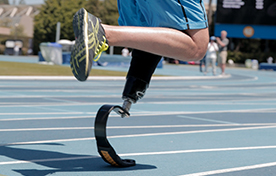Survival Guide for Caregivers: De-Stressing to Stay Healthy
More than 50 million Americans are providing unpaid care for family members who are elderly, chronically ill or who have a disability. Studies show that these caregivers (also called informal or family caregivers) are less likely to take proper care of themselves and suffer in various ways as a consequence.
Some of the negative effects of caregiving are:
- Caregivers age 66 to 96 have a 63 percent higher risk of dying than others their age.
- Caregivers use prescription drugs for depression, anxiety or insomnia 2-3 times more often than the general population.
- Caregivers lose an average of $659,000 in wages, pensions and Social Security benefits over a lifetime.
- The following tips for helping caregivers manage their stress and stay healthy were compiled from numerous sources.
Organize Your Life
- Recognize what you have control over and what you do not..
- Write down and prioritize your daily routine and eliminate nonessential elements.
- Be flexible enough to change priorities when something you can’t control happens.
- Ensure that your care receiver’s financial, legal and medical records are in order and easily accessible.
- Post lists of phone numbers, medicines and other important information where you can easily find them.
- Know your limits—taking on more tasks than you can handle will cause stress.
Eat Healthful Meals Each Day
- Eat lots of fruits, vegetables and whole grains. Ask your physician about vitamin supplements.
- Drink plenty of water and other nonalcoholic, non-caffeinated fluids.
- Indulge in a favorite dish if you are stressing. “Comfort foods” high in complex carbohydrates like pasta and potatoes may actually make you feel better.
- Prepare extra portions when you are cooking. Put leftovers in individual, labeled containers and place them in the freezer for quick, ready-to-heat meals.
- For time off from meal-making, groups like Meals on Wheels will provide nutritious meals to older people and people with disabilities for free or for a minimal charge.
Get Sufficient Rest and Sleep
- Maintain a regular sleep schedule, and follow a consistent bedtime routine if possible.
- Don’t exercise too close to bedtime.
- Don’t consume caffeine or alcohol in the evenings.
- Turn down the thermostat. Cooler temperatures help induce sleep.
- Listen to relaxation tapes to lull yourself to sleep.
Exercise Regularly—Monitor Your Physical Health
- Schedule and keep regular physical checkups.
- Make activities you enjoy your exercise regimen. Whether it’s walking, swimming or gardening, get your exercise in a regular physical activity that already appeals to you.
- Combine exercise and social interaction by making sports “dates” with friends.
- Stretch—Stretching is a great physical picker-upper that can be done anywhere, even if you have only a few minutes. It will help reduce tension and maintain muscle tone.
Accept and Express Feelings—Monitor Your Emotional Health
- Share your feelings. When friends or family members ask how you are, tell them.
- Keep a journal. This is a healthy way to both express and monitor your feelings.
- Don’t isolate yourself – schedule visits with friends and family.
- Develop your problem-solving skills to reduce your anxiety about confronting issues.
- Remember to laugh. Stock up on humorous books, magazines and videos. Build a list of links to humor-oriented Web sites. Strive to share a laugh with your care receiver once a day.
- Learn calming exercises, such as deep breathing and meditation.
- Develop the habit of embracing loved ones and friends and petting animals. Studies show that these behaviors lower the body’s output of cortisol, a stress hormone. When cortisol dips, two “feel-good” brain chemicals – serotonin and dopamine – surge.
- Pursue activities that offer emotional satisfaction and give you “time away” from yourself and your situation, such as listening to (or playing) music, reading or communing with nature.
- Don’t self-medicate with alcohol, overwork or drugs.
- Common signs of depression include loss of appetite, sleeplessness, irritability, crying jags, inability to concentrate and forgetfulness. If you are experiencing these symptoms, contact a mental health professional.
Set Aside Time for Yourself
- Use family, friends, your religious group, respite care, home healthcare, or other services to arrange to take a break.
- Accept that it’s OK to do things that you enjoy. Take time to engage in your favorite pastime at least once a week.
- Reward yourself. Acknowledge that you deserve the occasional pampering.
- Engage in activities like reading, doing crossword puzzles or playing chess, which give your brain some “fun work” and can be stopped and resumed later.
Seek and Accept the Support of Others
- When someone offers help, don’t let shame or guilt stop you from accepting.
- Keep a list of chores and jobs to be done, and show it to people who offer to help.
- Make requests for help clear, specific and simple. Break complex tasks into separate steps. It’s easier for others to help if the job doesn’t seem overwhelming.
- Match tasks to talents; ask aspiring chefs who enjoy cooking for help with meals or green-thumb friends for help in the yard.
- Take comfort in knowing you are not alone. Join a caregiver support group.
- Sustain Your Spirituality
- If you belong to a religious organization, attend services, talk to your spiritual guide and ask for spiritual support from your group.
- Find significance in your role as a caregiver by seeking positive meaning in it and considering how you may become stronger through it.
- Whether religious or not, find faith in what you believe.
Additional Resources
The National Family Caregivers Association (NFCA)
http://www.thefamilycaregiver.org/index.cfm
National Caregivers Library
www.caregiverslibrary.org/
Net of Care’s Information and Resources for Caregivers
http://www.netofcare.org
More caregiving associations and organizations are listed in the following articles:
NLLIC Resources by Topic: Caregiving
http://www.amputee-coalition.org/nllic_topic/0109_caregiving.html
“Resources for Seniors with Limb Differences and Their Caregivers”
www.amputee-coalition.org/inmotion/jan_feb_03/seniors.html
“Who Cares for Caregivers?”
www.amputee-coalition.org/inmotion/jan_feb_00/caregivers.html
Disclaimer: The following information is provided and owned by the Amputation Coalition of America and was previously published on the website http://www.amputee-coalition.org or the Coalitions Newsletter, inMotion.








